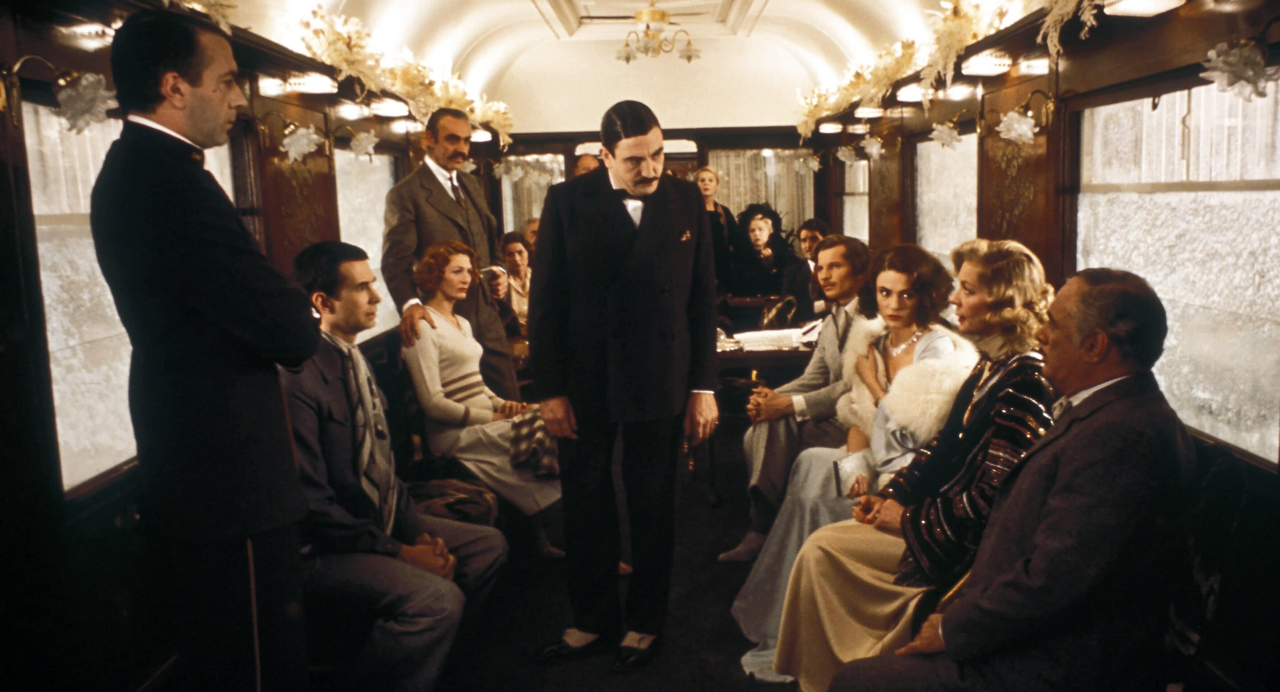
Murder on the Orient Express
Rating
![]()
Director
Sidney Lumet
Screenplay
Paul Dehn (Novel: Agatha Christie)
Length
2h 08m
Starring
Albert Finney, Lauren Bacall, Martin Balsam, Ingrid Bergman, Jacqueline Bisset, Jean Pierre Cassel, Sean Connery, John Gielgud, Wendy Hiller, Anthony Perkins, Vanessa Redgrave, Rachel Roberts, Richard Widmark, Michael York, Colin Blakely, George Coulouris, Denis Quilley, Vernon Dobtcheff, Jeremy Lloyd, John Moffatt
MPAA Rating
PG
Review
Great directors can turn great novels into great films and while not everything Agatha Christie had published could be spun into gold, one of the seminal depictions of her novels arrived with Murder on the Orient Express, an opulent, all-star vehicle that defined how her adaptations should be handled.
The novel is set aboard the luxurious Orient Express, its passengers the wealthiest of travelers and its intrigues expansive beyond its narrow confines. During the time of the novel (1934) and the time of the film’s release in 1974, the Orient Express ran from Istanbul to Calais in northern France. It is from Istanbul that Christie’s novel starts out, taking Hercule Poirot (Albert Finney) on a journey he wasn’t supposed to be on into a mystery unlike any other he had solved.
On board this particular train are a group of individuals who all had dealings with the victim, Mr. Ratchett (Richard Widmark), who may have had something to do with the kidnapping and murder of Daisy Armstrong, an event set up in the film’s opening scenes. As Poirot interrogates the passengers one by one, inconsistencies and new mysteries reveal themselves over the course of the film, building into a denouement that was no doubt a surprise for anyone who hadn’t read the novel. For those who had, it was delightful to watch it all unravel.
Until David Suchet took on the mantle in 1989, Finney delivered the exemplar performance of the Poirot character. An odd figure whose egotism was backed up by his peerless observational skills, Poirot weaves through the motives and alibis like the master detective he is and keeps the audience engaged throughout. He’s surrounded by a bevy of brilliant actors, each bringing their characters’ motives and personalities to vivid life with Lauren Bacall, Ingrid Bergman, Wendy Hiller, Anthony Perkins, and Richard Widmark delivering the film’s finest performances. Martin Balsam, Jacqueline Bisset, Jean-Pierre Cassel, Sean Connery, John Gielgud, Vanessa Redgrave, Rachel Roberts, and Michael York are almost as good, rounding out a terrific ensemble that would be the envy of many filmmakers to come.
That should come as no surprise for those familiar with Sidney Lumet’s work. A master of such collective dramas, Lumet knew how to push his camera into the characters as they explored their motives and past traumas, enabling the audience to feel connected to figures who might have otherwise seemed distant. Those static close-ups let the actors work their magic and the end result was something brilliantly orchestrated. In an interior as confined and claustrophobic as the train cars on the Orient Express, especially the sleeping cars, it can be challenging to capture both the elegance and the slipperiness of a criminal escaping judgement, even when their journey is snowed-in during their trek through the mountains of Yugoslavia. Geoffrey Unsworth should be commended for keeping the film feeling open while being so cramped.
Anne V. Coates’ editing is tight and keeps suspense through the climactic revelations while the production design and costuming by Tony Walton are impeccable, but the cream of the craft crop is Richard Rodney Bennett’s indelible score. The opening credits are a master class of dramatic invention, establishing the tone and evocative nature of the crime the audience is about to see. Pair this with his subtle underscore and character music for the train itself, rolling the audience out of the station and into something grand and exciting, and you have a gorgeous film that set the standard for the Christie adaptations to follow while setting a bar perhaps too high for anything to come close.
Murder on the Orient Express was perhaps the pinnacle of 1970s all-star features, having perfected the kind of large investments that had diminished in the prior decades thanks to the fading popularity of films like The Greatest Show on Earth and Around the World in 80 Days. Lumet’s film reset the narrative and if nothing quite lived up to its hallowed status, at least we’ll always have the Orient Express.
Review Written
October 31, 2023



















Leave a Reply
You must be logged in to post a comment.